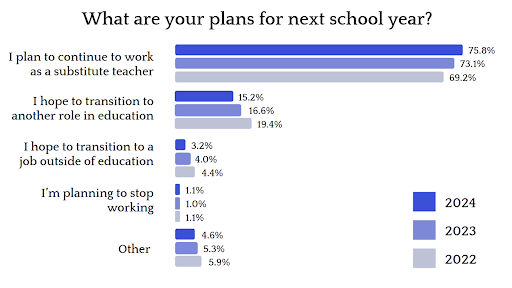The Benefits of Being a Substitute Teacher or Paraprofessional Before Becoming a Certified Teacher

Adaptable and dependable, paraprofessionals and substitute teachers possess the skills and knowledge to support student success. These roles not only help teachers fill in the gaps, they are also the substantial glue that holds districts together.
“Teachers love when they can return to the classroom from being absent and their students haven't missed a beat,” said Greg Del Russo, Director of Grants Development at iLearn Schools. “When the substitute teacher is on point with the lesson the teacher leaves behind for them, the students are then truly ready to take on the challenges of the next day's lesson.”
Teacher apprenticeship programs recognize these qualities in school support staff and leverage them to address teacher shortages, target critical subject areas and offer professional development opportunities that cater to their target audience.
ParaPreppED is one of two teacher apprenticeship programs in New Jersey. Rutgers University’s Graduate School of Education was recently awarded $400,000 for the New Jersey Department of Education’s New Jersey Teacher Apprenticeship Program grant. The funding supports partnerships with the Teacher Apprenticeship Network and geographically and enrollment-diverse districts to support instructional support staff to become full-time licensed K-12 teachers.
The model meets substitute teachers and paraprofessionals where they are, allowing them to use paid, on-the-job experiences to supplement typical classroom instruction. In the three years since teacher apprenticeship programs were launched, they have expanded to 46 states, the District of Columbia and Puerto Rico.
Paraprofessionals and substitute teachers already know classroom foundations
It’s already well established that classroom support roles are necessary to a district’s ecosystem. Just as important, however, is how they provide representation for the student population, often reflecting the rich diversity in New Jersey.
“They are often members of the school community and reflect the racial and linguistic diversity of our K-12 student population,” said Kwamé Floyd, founder and executive director of Teacher Apprenticeship Network.
Many substitute teachers and paraprofessionals work full-time and regularly observe educators in their environment. This presents an opportunity for ongoing, hands-on training foundational to teaching.
“Long-term substitutes essentially take on the role of a lead teacher for an extended time period, too, and are especially key players in driving students' growth,” Del Russo said. “Teachers' aides and substitute teachers truly make a great difference as key supports of student learning."
Investing in a transition between a school support role and a full-time educator only benefits districts. Substitute teachers and paraprofessionals typically stay in one district, often one building. Establishing rapport with students and staff is a big task for new teachers, however, that learning curve has already been conquered for most support staff.
“In addition to providing critical support for students, paraprofessionals and student support staff are some of the strongest candidates for the teaching pipeline,” Floyd said.
ParaPreppED leverages those benefits to create opportunities
Historically, substitute teachers and paraprofessionals have been ready and eager to take the next steps. They have the motivation and the foundation. The average National Education Association paraprofessional, for example, has been in the field for 12 years. Additionally, 75 percent of paraeducators have at least an associate degree, while 36 percent have at least a bachelor’s degree.
Substitute teachers are equally motivated. In a 2024 survey of 10,000 substitute teachers, 34 percent said they plan to pursue certification to become a full-time teacher.

Data from Red Rover.
The challenge, however, presents itself in those steps.
“Unfortunately, individuals who aspire to become certified teachers in New Jersey must navigate multiple, complex institutions; this process can be overwhelming and expensive for many aspiring teachers, exasperating an already strained teacher pipeline and leading to more classrooms without a teacher,” Floyd said.
Luckily, teacher apprenticeship programs have provided a solution that turns mountain-sized challenges into molehills. These programs work because of their “earn and learn” model that offers paid, on-the-job learning experiences as a path to certification.
ParaPreppED is a new teacher apprenticeship program that provides necessary resources for substitute teachers and paraprofessionals to become certified full-time teachers. The program’s format accommodates the unique experiences and needs of substitute teachers and paraprofessionals, making the appropriate channels easy for them to reach.
Overall, the program aims to:
- Increase the number of Registered Teacher Apprenticeships in the state;
- Expand the teacher pipeline, leveraging the existing district talent;
- Address barriers for aspiring teachers through targeted support like Praxis prep; and
- Conduct and disseminate ongoing research on the implementation and impact of the initiative.
Noting the significant impact the teacher shortage has made on critical subjects like math, science, special education, ESL and Bilingual Education, the program’s design works to target these areas. Participants in this program are chosen based on their interests and alignment with each district’s apprenticeship program’s selection criteria.
“This apprenticeship program carves out a career pathway for the next generation of professional educators who will lead New Jersey classrooms and deliver quality education to our students,” Commissioner of Labor and Workforce Development Robert Asaro-Angelo said in a statement.
If you’re considering following your dream of teaching, Rutgers Alternate Route can offer you the support and training you need to succeed. Be sure to follow Rutgers Alternate Route on Twitter and sign up for Alternate Route’s monthly newsletter for more information and stories from the field of education.

 Heather Ngoma has over 25 years of experience collaborating with educators across New Jersey to drive education innovation. She currently serves as the Director of the Rutgers-GSE Alternate Route Program in the Department of Learning and Teaching, a program which helps career changers, recent college graduates, and other aspiring education professionals become licensed teachers in New Jersey. Follow her on Twitter @heatherngoma.
Heather Ngoma has over 25 years of experience collaborating with educators across New Jersey to drive education innovation. She currently serves as the Director of the Rutgers-GSE Alternate Route Program in the Department of Learning and Teaching, a program which helps career changers, recent college graduates, and other aspiring education professionals become licensed teachers in New Jersey. Follow her on Twitter @heatherngoma.





